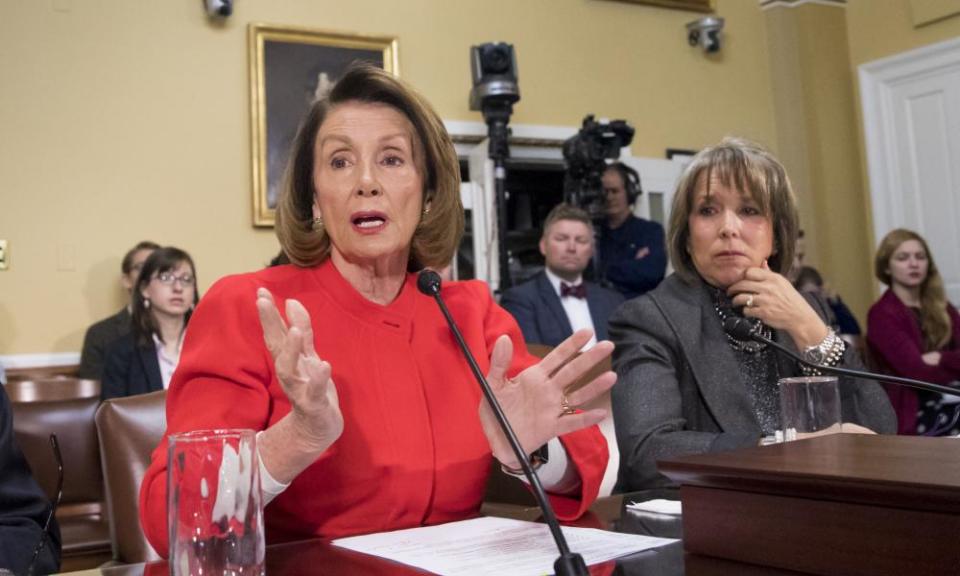Congress passes short-term spending bill to avert government shutdown
Senate passes legislation before deadline
Immigration and healthcare issues to remain unresolved until the new year

Congress has averted a shutdown of the federal government, narrowly passing a temporary spending bill that will now go to Donald Trump to sign but that will only delay the reckoning for a month and will kick contentious issues such as immigration and healthcare into the new year.
Congress had until midnight on Friday to pass a “continuing resolution” to keep government operations running. The House bill passed by 231-188 and the Senate shortly afterwards by 66-32. The concerted Republican effort will push the deadline back by funding the government through 19 January.
The bill passed mostly on party lines with only 13 Democrats in the House voting to fund the government and only 16 Republicans voting against the resolution. In the Senate, the 60-vote threshold was just passed with the help of Democrats in more conservative states.
Congress will now adjourn on Friday and will not reconvene until January.
The spending bill unveiled by House Republicans on Thursday includes a short-term reauthorization of the children’s health insurance program, which provides free or low-cost healthcare to roughly 9 million children annually. It also funds a program that enables veterans to receive healthcare services from community providers rather than within the confines of the Veterans Affairs system.
The bill does not, however, address the future of Barack Obama’s healthcare law. Republicans undermined the Affordable Care Act this week by repealing the law’s individual mandate, which required Americans to purchase health insurance or pay a penalty, as part of their tax plan.
A bipartisan group of senators had nonetheless hoped to pass a measure to stabilize the insurance markets established under the Affordable Care Act as part of spending negotiations. But conservatives in the House deemed any effort to bring stability to the healthcare law a nonstarter, prompting Republicans in the Senate to punt that issue to January.
The spending bill also leaves in limbo the fate of nearly 700,000 young undocumented immigrants, known as Dreamers, who were brought to the US as children.
The group was freshly exposed to the threat of deportation following Donald Trump’s decision in September to rescind an Obama-era program, commonly referred to as Daca, which allowed qualifying Dreamers to come out of the shadows to legally study and work in the US.
Although Trump gave Congress a deadline of 5 March to replace Daca through legislation, Democrats have long vowed not to leave town unless protections for Dreamers are enacted before the year’s end. Republicans have insisted the issue is separate from funding for the government and can be dealt with in early 2018. As a result, most Democrats voted against the legislation because it did not protect Dreamers.
Mitch McConnell, the Senate majority leader, announced this week he will hold a vote in January on legislation to resolve the status of Dreamers pending a compromise. A bipartisan working group of senators is in the midst of negotiations on the issue.
Chris Collins, a Republican from New York, told reporters immigration could wait until the new year. “These are are reasonable discussions but I think everyone agrees let’s not shutdown the government over Christmas.”
Trump accused Democrats on Thursday of risking a government shutdown in order to deflect attention from historic changes to the US tax code passed by Republicans this week.
“House Democrats want a SHUTDOWN for the holidays in order to distract from the very popular, just passed, Tax Cuts,” Trump tweeted. “House Republicans, don’t let this happen. Pass the C.R. TODAY and keep our Government OPEN!”
The Republican tax plan, which temporarily lowers individual rates while permanently extending tax cuts for corporations, has proved unpopular in most polling thus far.
Republicans were not without their own objections to the spending bill.
A pair of libertarian-leaning senators, Rand Paul of Kentucky and Mike Lee of Utah, voted against the spending bill on grounds that it included a long-term extension of a controversial surveillance program. John McCain, the Republican senator from Arizona, was absent as a result of his treatment for brain cancer.
The House bill includes a temporary extension of a provision known as Section 702, within the Foreign Intelligence Surveillance Act, that was set to expire at the end of the year.
The provision grants the US government with the authority to spy on the electronic communications of foreigners overseas without a warrant. The US intelligence community has defended the program as necessary for counter-terrorism activities and national security.

